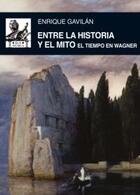In few artists time has the importance that it has in Wagner. It is not only decisive for the composer or the theorist of interpretation, but also for the playwright, who takes advantage of music to destabilize the drama, causing the continuous presence of the past and the anticipation of the future. With the exception of Meistersinger and not entirely, in both romantic opera and musical drama time is as Hamlet said, out of place. Sometimes, it recedes and the past returns, as for Amfortas (first, as torment; later, as a cure). On other occasions the action follows patterns incompatible with clock time, as in the third act of Tannhäuser. His pulse changes abruptly, upset by Alberich's theft, or tears, like the rope of destiny on Brünnhilde's rock.
Between History and Myth analyzes the way in which Wagner constructs time from different angles. First, through the ten essential wo...read more








